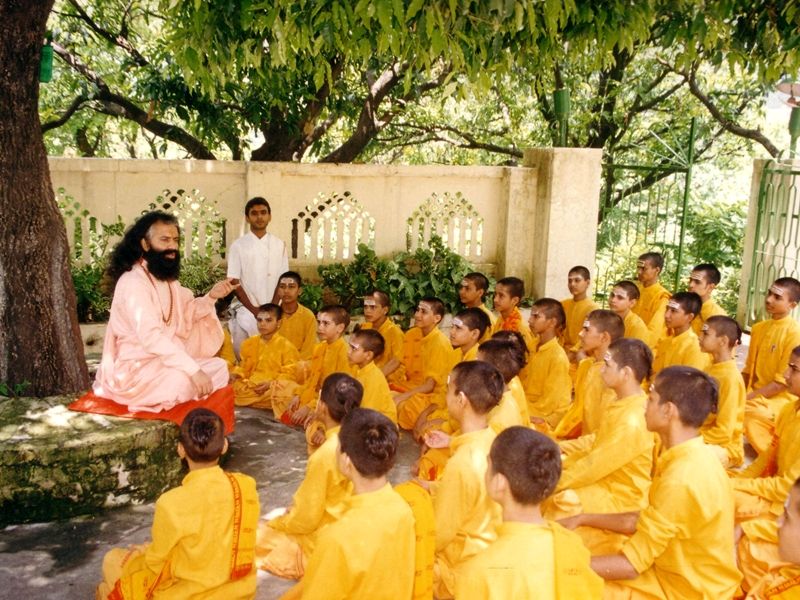– Bandana Brahmin
Months after announcing a major overhaul of India’s education system through the National Education Policy (NEP 2020), the Centre is mulling setting up a Vedic education board for schools apart from the already existing CBSE board. Reportedly, it is also considering options to mainstream Vedic education in the school curriculum.
In this connection, it is important to note that in January 2019, the education ministry had already permitted the Baba Ramdev-run Patanjali group to set up a Bhartiya Shiksha Board (BSB) on ‘Indian knowledge systems’ — making it the first private education board to receive the Centre’s nod. The decision was taken in a meeting of the governing council of the Maharshi Sandipani Rashtriya Vedavidya Pratishthan (MSRVP) – a fully-funded autonomous body under the HRD Ministry working on promotion of ‘ved vidya’ – chaired by former HRD minister Prakash Javadekar.
However, the new proposal — believed to be backed by the Rashtriya Swayamsevak Sangh (RSS) — is to set up a separate Vedic education board. Several meetings have been held over the past few months and yet another meeting has been scheduled where representatives of MSRVP and officials of the Department of School Education, the National Council of Education Research and Training (NCERT) and the CBSE, among other attendees, will discuss ways and means to ‘mainstream’ Vedic education in school curriculum.
Meanwhile, the education ministry’s school education department reportedly deems setting up one more education board unnecessary because the government already runs the Central Board of Secondary Education and the National Institute of Open Schooling. It has also put forward the argument that the value education lessons imparted in schools across various boards already cover various aspects of Vedic education and therefore, a separate board would be redundant.
Clearly, with the new national education policy setting the stage for overdue reforms in India’s primary-secondary education sector — that is struggling to limp back to normalcy after the pandemic-induced disruption — the government’s top-most priority should be enabling and fast-tracking implementation of the various provisions of the visionary NEP 2020 — aligning the pedagogical structure to international education standards, emphasising on skills-based/vocational education, moving away from rote-learning towards holistic education, to name a few.
With the proposal still in the discussion stage, K-12 education leaders across the country while welcoming the move to offer Vedic education as a curricular option to students believe the approach adopted to integrate it in the curriculum will make all the difference.
“The proposal to integrate Vedic education in the school curriculum was first mooted by former HRD minister Prakash Javadekar shortly after the Maharashtra International Education Board was set up in 2018 under the leadership of former chief minister Devendra Fadnavis. While integration of a new discipline into the core curriculum is welcome, schools should have the flexibility to choose based on their institutional goals and vision. Also, going by the demands of the times and the steadily rising demand for progressive education, the government should promote more ‘futuristic education’ focused boards instead of boards promoting a narrow field of study or specialised knowledge,” says Francis Joseph, a noted educationist and co-founder of School Leaders Network (SLN) Foundation (estb.2015) which works with 720 private and public schools countrywide to promote collaboration and sharing of best teaching learning practices.
Dr. Bijaya Kumar Sahoo, founder-chairman of the Odisha-based SAI International Schools, says, “I believe introducing Vedic education in mainstream school curriculum will prove beneficial for the students. By promoting true learning rather than merely testing students’ learning levels and by creating a strong foundation for their holistic development, it can enable their seamless transition to higher education in any part of the world. Infact, several elements of 21st century education such as experiential learning are drawn from the Vedas and the ancient Indian education system. Having said that, any new curriculum must be aligned with the National Curriculum Framework before its integration into mainstream education. While the proposal seems good, the approach adopted to implement it will make a difference and I think it is too early to comment on that at the moment.”
“I have always believed in offering more options to students because every new area of learning expands their mental horizons and contributes to their well-rounded development. Be it Vedic education or some other specialised knowledge stream, students should be able to choose based on their interest and aptitude. So as long as there is the flexibility aspect, I definitely welcome the move,” says Arunabh Singh, director, Nehru World School, Ghaziabad.
Earlier in March 2019, shortly after the HRD Ministry sanctioned the Bhartiya Shiksha Board, Professor Vivek Kumar, department of sociology, JNU, New Delhi, said in an interview with FirstPost, “The idea for a ‘Board for Vedic education’ is a step towards reproduction of cultural hegemony and ethnocentrism. Is it an indirect path to establish Brahminical hegemony as they were/are the custodian of Sanskrit language and great tradition related to Sanskritic texts? Is it going to undermine other cultural traditions which need special attention? Rather than standardisation of cultures, what India needs is celebration of diversity and equal importance of every socio-political-cultural entity.”
Also read: From alternate to mainstream – Edtech is fast changing the face of education
Posted in National, News
























